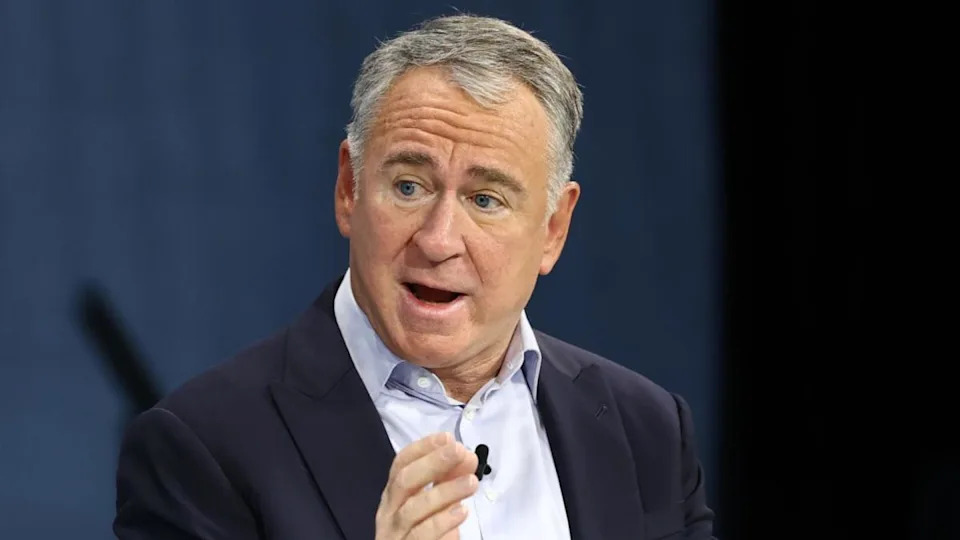A highly controversial figure in some circles, Ken Griffin remains one of Wall Street’s most prominent and respected hedge fund managers.
Since founding Miami-based hedge fund Citadel Securities in 1990, Griffin has amassed a net worth of more than $44 billion. This makes him one of the highest-earning people in his field, second only to Israel Englander of Millennium Management.
💵💰 Don't miss the move: Subscribe to TheStreet's free daily newsletter 💰💵
While Citadel’s aggressive trading strategy has garnered criticism over the years, the fund’s success is undeniable, as evidenced by the fact that it reported its largest trading revenue haul to date in March 2025, with 55% gains for the year.
As the artificial intelligence (AI) boom has minted a new generation of market winners over the past several years, some financiers have embraced this new technology. Griffin has taken a different approach and expressed some skepticism. But some recent filings reveal he sees potential in one AI stock.

Ken Griffin recently doubled down on one AI stock, trimmed his bet on a close rival
Since the launch of ChatGPT in 2022, many companies have focused on tapping into this booming market, from established tech-sector leaders to new, cutting-edge startups. Through it all, both retail and institutional investors have been working hard to identify the next winners before they surge.
Related: Billionaire fund manager unloads over $100 million of Tesla stock
For many, that meant trying to find the next Nvidia ( NVDA ) . Often considered the industry’s most prominent chipmaker, the tech-sector giant has become synonymous with the AI boom, as its shares surged to new heights and analysts heaped praise on the stock.
Despite its track record, Griffin isn’t so bullish on Nvidia’s growth prospects. During the first quarter of 2025, Citadel slashed its NVDA stock position roughly in half, selling 1,555,264 shares. Data shows that this puts it among the fund’s top sells by change in portfolio percentage.
Griffin hasn’t embraced AI as much as some of his peers, maintaining a skeptical outlook toward the technology’s overall impact.
“Do we use it in our investment business? A little bit, a little bit. I can’t say it’s been game-changing,” he recently stated . “It saves some time. It’s a productivity enhancement tool. It’s nice [but] I don’t think it’s going to revolutionize most of what we do in finance.”
He added that generative AI models are limited as investment analysis tools, since they are still unable to produce long-term forecasts.
While Citadel trimmed its stake in Nvidia in Q1, it doubled down on one of the chipmaker’s biggest rivals. Advanced Micro Devices ( AMD ) also produces graphics processing units (GPUs) that help companies build and scale large language models (LLMs).
More Hedge Fund News:
While it’s often overshadowed by Nvidia, AMD stock seems to be a favorite of Griffin. Citadel increased its stake in the chipmaker by more than 300%, adding 2,786,115 shares to its position during Q1, a current market value of roughly $326 million.
Why does Griffin favor one AI stock over the other?
As close rivals, Nvidia and AMD are often compared, despite the fact that Nvidia has consistently outperformed its smaller-cap peer. Wall Street is quite bullish on the two stocks, which maintain 34 and 22 buy ratings, respectively, resulting in a Strong Buy consensus for both.
Related: One AI stock makes up 78% of Nvidia's investment portfolio
However, when someone like Ken Griffin bets big on one stock while trimming his position in the other, investors are likely to listen. The answer may lie in the zero-sum nature of financial markets, as multiple analysts have illustrated.
Jay Goldberg of Seaport Research Partners recently highlighted several potential concerns regarding NVDA stock, including questions from customers regarding the utility of Nvidia’s technology and the “complexity required for deployments of Nvidia systems.”
He added that many customers are taking steps to design their own chips in-house, in a clear attempt to decrease their reliance on Nvidia’s overpriced GPUs.
Meanwhile, UBS analyst Timothy Arcuri recently issued a bullish take on AMD, speculating that it could benefit from Nvidia’s problems.
“The story in our eyes still hinges on the new family of AI solutions coming next year, but customer traction among US hyperscalers is gaining momentum, and AMD may be able to draft off of NVDA’s ‘growing pains’ in ramping these new system solutions this year,” he stated.
Related: Veteran fund manager who forecast S&P 500 crash unveils surprising update
Billionaire fund manager, skeptical of AI, backs shocking stock first appeared on TheStreet on May 24, 2025





